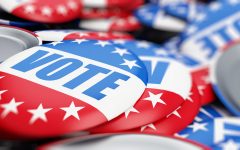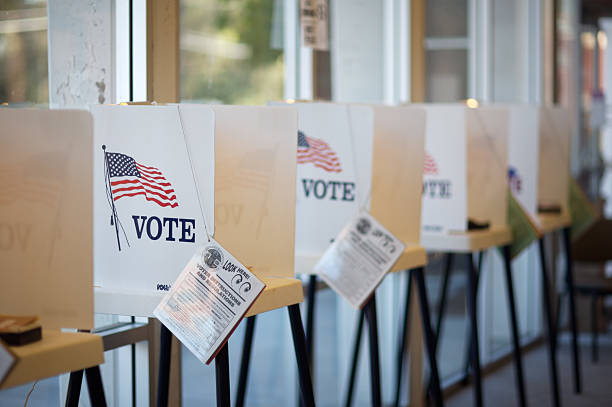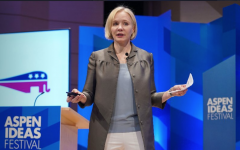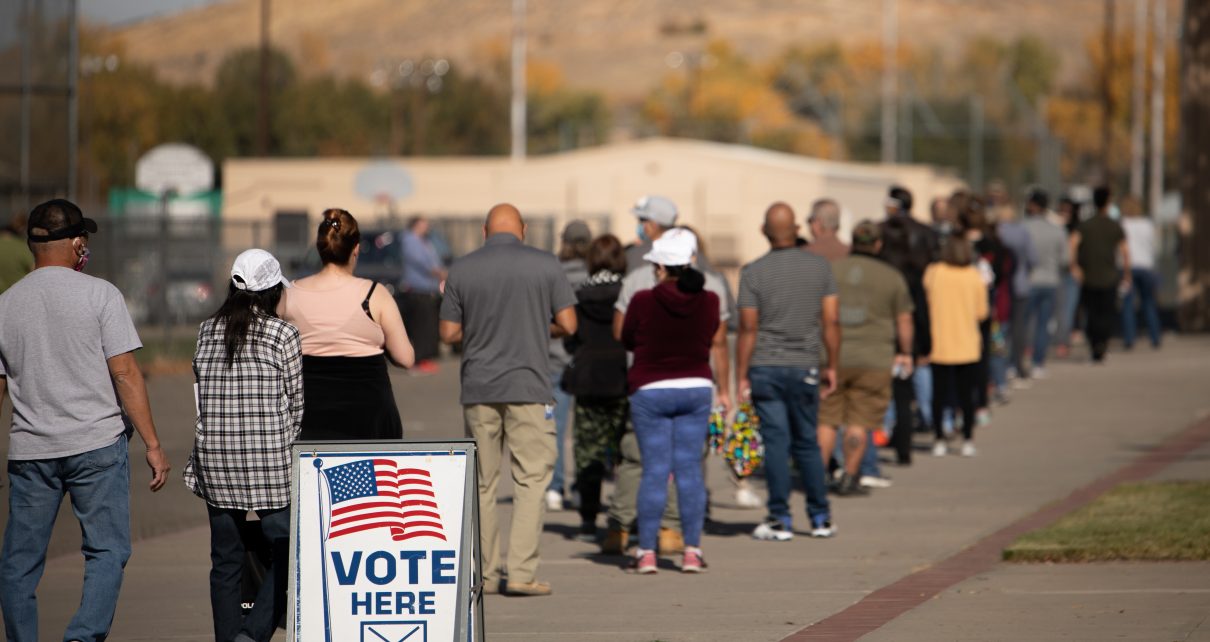
Voters in Clark County, Nevada line up to cast ballots. (Image: Shutterstock)
The Perils of Ranked Choice Voting and Open Primaries
In an interview with the Director of the Center for Election Integrity, Mike Vallante lays out the perils of ranked-choice voting and open primaries
By Megan Barth, October 9, 2024 1:25 pm
The following interview was conducted with Mike Vallente in November 2023. It has been republished due to demand.
As Nevadans prepare to vote in the 2024 general election, voters will be asked to vote again on a ballot initiative that would fundamentally transform the way Nevadan’s vote in a primary and in an election. Not often is their bipartisan agreement in the Silver State, however, Democrats, Republicans and even progressive nonprofits have united against ballot Question 3.
Question 3 passed in November 2022 by 53 percent of the vote, approving ranked-choice voting and open primaries for statewide elections. This constitutional change requires Nevada voters to approve the measure again in November 2024 for it to take effect in 2026. After it’s passage, Mike Draper of Nevada Voters First, a PAC behind the effort, said, “With the passage of Question 3, Nevadans have shown their desire to put Nevada voters first and address political extremism and polarization in our state.”
Nevada Voters First raised $19.5 million for the 2022 election cycle and intends to continue their fundraising, advertising and messaging efforts to fundamentally change the way Nevadan’s vote.
But will open primaries and ranked-choice voting address political extremism and polarization in the Silver State?
According to Mike Vallante, Director of the Center for Election Integrity for the America First Policy Institute, contends that the passage of Question 3 will make political extremism and polarization much worse for Nevadans.
Our interview with Vallante exposes the perils of ranked-choice voting and open primaries, citing numerous examples in Democratic states and municipalities.
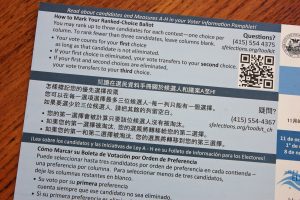
Nevadans may pass ranked-choice voting (RCV) through a ballot initiative that first passed in 2022 by a slim margin. It will be on the ballot again in 2024. If it passes a second time, it will fundamentally change the way Nevadans vote. So, what is RCV and why is it, in your opinion, not the best process or method of voting?
I think it starts with the basic thing that we as Americans have, which is whoever gets the most votes wins the game. With ranked-choice voting, you oftentimes have someone who finishes third or fourth that ends up winning, and that just makes no sense. That’s one of the problems that we have with it.
The other problem we have with it is that it’s a confusing system, and if you don’t believe it’s a confusing system, just look at history.
Let’s look at Oakland, California as an example. You’re not going to find anything more blue than Oakland with a heavy minority community. In their mayoral race, you had people who had no idea how they were supposed to vote. So, they went to vote and there were four people on the ballot. There’s one candidate that they voted for four times. Well, guess what? Their votes were invalidated. There were other people that went in and just voted once for one candidate. Well, guess what? With ranked-choice voting, if that one candidate doesn’t finish in the top four or ends up finishing fourth, their vote is discarded.
Basically, if someone voted four times for four different people, than that person has more power in their vote than you do. So, votes were taken away and discarded. That is called ballot fatigue. I think it was in the vicinity of over 20,000 votes that didn’t get counted in that election either by being disqualified because they voted for the same person all the time or because of ballot fatigue, and the person that got elected won by about 600 or 700 votes. It was so bad that the NAACP actually wanted to file a lawsuit against the city of Oakland, but the city put such onerous hurdles in front of them that they couldn’t afford to do it.
Another example, again in Oakland, California, where they have ranked-choice voting for the school board.
What happened was they miscounted the votes in the way they’re supposed to count. The way they actually counted was incorrect. Even though they’ve been doing ranked-choice voting for 10 years, the election workers miscounted the votes. So, they actually certified the wrong person as the winner. They didn’t realize that until an audit was done, and then realized they certified the wrong person. It was too late because the person was already sworn into office. So, they had to unswear the person out of office and swear in the new person. There are instances like that across the country where just the impracticality of it makes it difficult. It makes it more difficult for the election workers because they now to go back and reallocate votes based on ranking.
One of the worst things that ranked-choice voting creates is skepticism in elections due to the lack of transparency. People don’t understand how the system is being done. Voters don’t know for days or even weeks who actually won. We should be able to have an instantaneous result. If you think it’s bad now, once a state or city implements RCV, it extends the time to certify an election because you have to keep recounting and recounting and recounting.
Another example is in New York City and the race for mayor. Eric Adams was not determined to be the winner for three weeks.
Ranked-choice voting is not a system that works for the voter. It doesn’t work for the election worker, it doesn’t work for election integrity, and it doesn’t work for transparency. It’s the kind of system that once people learn more about it, they have more and more objections to it.
Alaska and some other states and municipalities has implemented RCV. Has it worked for them?
I think if you go to Alaska and you ask people what just occurred–where the candidate who finished fourth, after the first round of balloting, ended up winning the election–they oppose it. There are polls that show that even people who supported the concept of ranked-choice voting now oppose it because it is fundamentally unfair that someone who finished fourth gets elected. This is not a left or right issue. It’s a common sense issue and common sense says if you finish fourth, you didn’t win the race.
I think you see buyer’s remorse there and you see buyer’s remorse in Utah, which is another state where they instituted it. Another state is Maine where the Democratic congressional candidate finished second in the original round of polling. But due to ranked-choice voting, he ended up winning.
Another bellwether place is Minnesota. In Minnesota, they have ranked-choice voting at the local level in several cities and they wanted to begin the process of instituting it on a state and federal level in Minnesota. Again, I’m citing a blue state. The Hubert H Humphrey Public Policy Institute at the University of Minnesota opposed it because they said it is an onerous and confusing system for voters. After they came out with that report, the idea of doing ranked-choice voting on a statewide level was put aside.
I used those examples to say that even within the Left, they recognize the flaws of ranked-choice voting. Now, what you have in Nevada, because you traced the funding, are deep pockets…major deep pockets on the Left to implement this confusion.
Dark money from the Left is pouring money into this, not only in Nevada, but they’re trying it in Arizona and they’re trying it in Missouri. They’re going to try it in Georgia, and they’re going to try it in Ohio. They’re trying it everywhere they can, because one of the things the Left likes to do is if they can’t win at the ballot box based on issues and messaging, they try and alter the process.
I think this is one of those situations where they look at it and say if they can create a situation where the person that wins the most votes doesn’t win, and then takes it to another step, it creates more chaos and more opportunity for the candidate, who actually got the most votes, doesn’t win.

Speaking of chaos and opportunity, Question 3 adds open primaries as well. Sometimes referred to as “jungle primaries.” Does RCV automatically implement an open or jungle primary?
No, this is new. They’re are going to have the same kind of initiative in Arizona next year. I don’t call it an open primary. It’s a jungle primary. I mean, if anybody wants to see the dysfunction of California and the crazy things that we pass here, it’s because we have a jungle primary.
When they voted for it here in California, they thought it would bring more moderates into the election process, but it did exactly the opposite. It brought more fringe on the left and on the right.
In a jungle primary, everybody runs in a primary. You may have eight or nine candidates that decide to run–three or four independents, two or three Republicans, two or three Democrats, maybe a libertarian–they’re all on the ballot together and now with jungle primaries, the top five people who get the top five votes would then move on to the general election.
Then, the general election would be held in a ranked-choice voting manner. When they hold the general election, it’s not whoever gets the most votes, it’s whoever wins a ranked-choice balloting scheme. Ranked-choice voting is really a pollution of the election system.
The proponents argue that an open primary and/or RCV would provide independents a better opportunity to exercise their vote and have a voice in primary elections and general elections. How do you respond to that?
I respond that it’s not just in Nevada that you see rise of people registering as either declined-to-state or independent. It’s certainly not unique to Nevada in any shape or form.
Party primaries are for party members, and you have several states where if you are an independent on primary day, you can go in and declare which primary you choose to vote in. You can’t vote in both, but you can go in and say on this particular day, “I want to vote in the Republican primary” and you’re allowed to vote in the Republican primary, but you’re not able to go vote in the Democrat primary. I think that takes care of the fact that the independents feel left out in a primary situation, but a primary situation is really about who the party feels is their best candidate to run.
I would also say that if anybody thinks that having a jungle primary makes voting more moderate, centrist or unifying, look at what happened in California.
We have legislative districts where it’s a competition of who can be far-left or who can be far-right, depending on what district you’re in. When you look at the California model, it polarized things even more than what it was.
A jungle primary does nothing to bring people closer together to compromise.
The other part is, and, and I’ll go back to the basic premise of all of this, whoever gets the most votes wins may not like it, but that’s the way the system is. What ranked-choice voting does is it not only makes it more chaotic–because you have all of these candidates running. It makes it more difficult to count the votes, like in the Oakland school board race, where they have done ranked-choice voting for 10 years and they still screwed it up.
Ranked-choice voting is the kind of thing that the candidate who got the most votes, doesn’t always win. I think that’s just basically something people have a common sense reaction to in that there’s something wrong with a system like that.
One last point, almost 25 percent of people believe that Hillary Clinton won the 2016 presidential election. So nearly eight years later, a quarter of the country still believes Hillary Clinton won. Questions surrounding election integrity is not anything new, maybe it was amplified in 2020, but that skepticism of our election system has been there a while and every time you have things where the system breaks down, people have more distrust and cynicism. That distrust and cynicism is going to grow and grow and what we need to do is go in the opposite direction to make elections more transparent, not less transparent through ranked-choice voting.
- Illegal Alien Identified As Wrong-Way Driver in Fatal Crash That Killed LVMPD Officer - December 23, 2024
- Senator Rosen Joins Letter Raising Concerns About Pete Hegseth’s Nomination - December 20, 2024
- NV SOS Launches Four Investigations Into 2024 Election Violations - December 20, 2024


